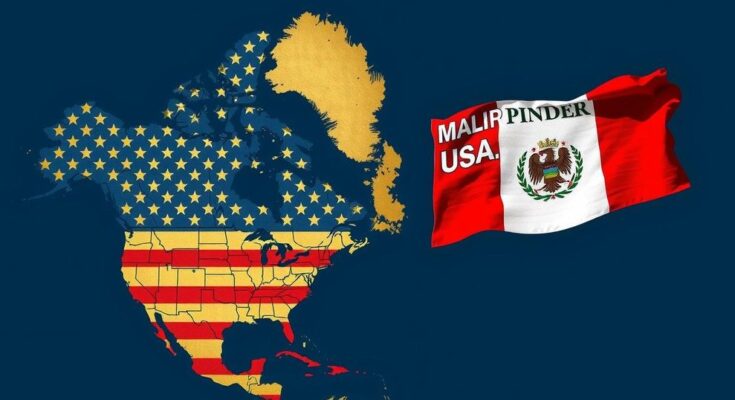President-elect Donald Trump plans to impose a 10% tariff on Chinese products and a 25% tariff on imports from Canada and Mexico to combat drug trafficking and illegal immigration. He aims to leverage these tariffs until both countries address the drug crisis affecting the U.S., reiterating his commitment to his America First policy.
President-elect Donald Trump has announced plans to impose significant tariffs on China’s, Canada’s, and Mexico’s products as part of his strategy to mitigate the influx of illegal drugs and immigrants into the United States. Trump stated he will enforce a 10 percent tariff on Chinese goods and a 25 percent tariff on products from Canada and Mexico, emphasizing that these tariffs would remain until the respective countries address their roles in drug trafficking and immigration issues.
In a post on his Truth Social platform, Trump attributed the flow of fentanyl and other drugs into the U.S. to China and Mexico, underscoring his frustration with China’s inaction regarding drug smuggling, despite earlier promises to penalize drug dealers severely. He also expressed his intent to utilize tariffs as a means to compel policy changes from Mexico and Canada concerning border security and drug control. This assertive approach forms a central component of Trump’s ongoing campaign messaging as he seeks to reinforce his “America First” policy.
Trump’s proposed tariffs come as he maintains an uncompromising stance against what he perceives to be an open border policy contributing to a crisis of crime and drugs. By threatening to institute these tariffs, he aims to leverage economic tools as a means to achieve broader national security goals. The announcement coincided with discussions among industry experts about the potential implications of such tariffs on the overall economy, particularly concerning trade relations with key partners.
The tariffs reflect a broader trend within Trump’s administration to prioritize national security and economic self-interest, which he successfully leveraged during his previous term in office. This approach contrasts markedly with traditional diplomatic strategies, demonstrating a willingness to use economic leverage as a tool for foreign policy and domestic protection.
The topic revolves around President-elect Donald Trump’s proposed tariffs aimed at addressing serious issues such as drug trafficking and illegal immigration. Following the escalating drug crisis in the United States, particularly associated with fentanyl, Trump’s announcement signals a return to aggressive trade tactics previously described during his campaign. The implications of such tariffs could profoundly affect U.S. relationships with Canada and Mexico, both crucial partners, particularly in trade. Trump’s rhetoric positions economic policy as intertwined with national security, marking a significant divergence from conventional diplomatic efforts to resolve transnational issues.
In conclusion, President-elect Donald Trump’s proposed tariffs on Chinese, Canadian, and Mexican imports signify a strategic maneuver to address drug trafficking and immigration challenges facing the United States. By leveraging economic measures as tools for policy change, Trump aims to fortify national security while adhering to his America First agenda. The implications of these tariffs will likely provoke significant discussion regarding their potential economic impact and the broader effects on international relations, particularly with neighboring trading partners.
Original Source: www.newsweek.com




